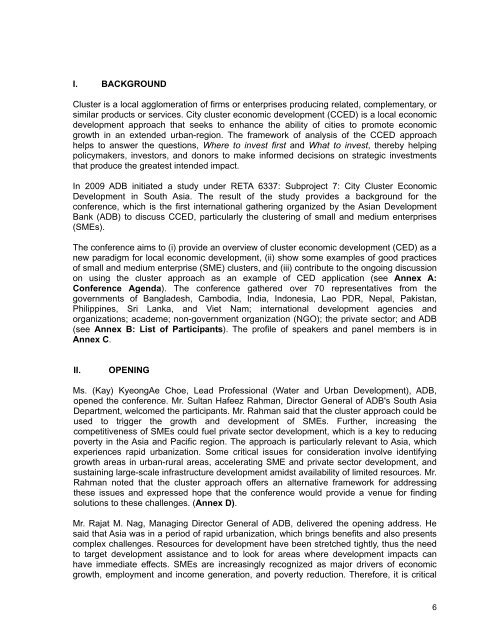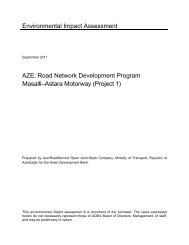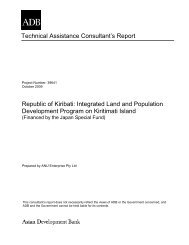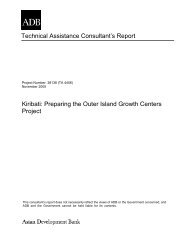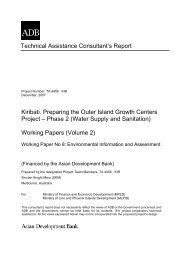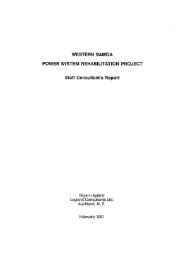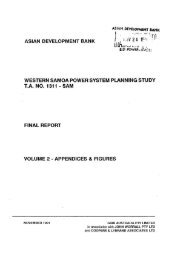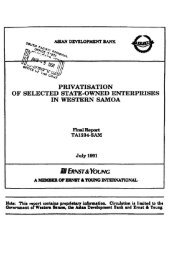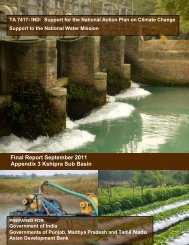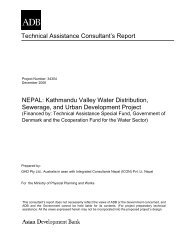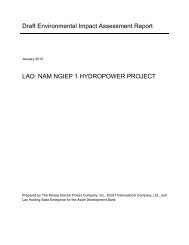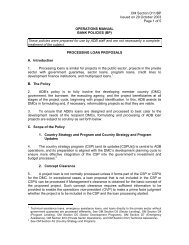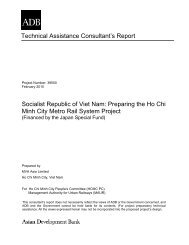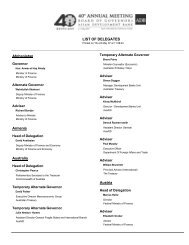international conference on cluster economic development - Asian ...
international conference on cluster economic development - Asian ...
international conference on cluster economic development - Asian ...
Create successful ePaper yourself
Turn your PDF publications into a flip-book with our unique Google optimized e-Paper software.
I. BACKGROUND<br />
Cluster is a local agglomerati<strong>on</strong> of firms or enterprises producing related, complementary, or<br />
similar products or services. City <strong>cluster</strong> ec<strong>on</strong>omic <strong>development</strong> (CCED) is a local ec<strong>on</strong>omic<br />
<strong>development</strong> approach that seeks to enhance the ability of cities to promote ec<strong>on</strong>omic<br />
growth in an extended urban-regi<strong>on</strong>. The framework of analysis of the CCED approach<br />
helps to answer the questi<strong>on</strong>s, Where to invest first and What to invest, thereby helping<br />
policymakers, investors, and d<strong>on</strong>ors to make informed decisi<strong>on</strong>s <strong>on</strong> strategic investments<br />
that produce the greatest intended impact.<br />
In 2009 ADB initiated a study under RETA 6337: Subproject 7: City Cluster Ec<strong>on</strong>omic<br />
Development in South Asia. The result of the study provides a background for the<br />
<str<strong>on</strong>g>c<strong>on</strong>ference</str<strong>on</strong>g>, which is the first <str<strong>on</strong>g>internati<strong>on</strong>al</str<strong>on</strong>g> gathering organized by the <strong>Asian</strong> Development<br />
Bank (ADB) to discuss CCED, particularly the <strong>cluster</strong>ing of small and medium enterprises<br />
(SMEs).<br />
The <str<strong>on</strong>g>c<strong>on</strong>ference</str<strong>on</strong>g> aims to (i) provide an overview of <strong>cluster</strong> ec<strong>on</strong>omic <strong>development</strong> (CED) as a<br />
new paradigm for local ec<strong>on</strong>omic <strong>development</strong>, (ii) show some examples of good practices<br />
of small and medium enterprise (SME) <strong>cluster</strong>s, and (iii) c<strong>on</strong>tribute to the <strong>on</strong>going discussi<strong>on</strong><br />
<strong>on</strong> using the <strong>cluster</strong> approach as an example of CED applicati<strong>on</strong> (see Annex A:<br />
C<strong>on</strong>ference Agenda). The <str<strong>on</strong>g>c<strong>on</strong>ference</str<strong>on</strong>g> gathered over 70 representatives from the<br />
governments of Bangladesh, Cambodia, India, Ind<strong>on</strong>esia, Lao PDR, Nepal, Pakistan,<br />
Philippines, Sri Lanka, and Viet Nam; <str<strong>on</strong>g>internati<strong>on</strong>al</str<strong>on</strong>g> <strong>development</strong> agencies and<br />
organizati<strong>on</strong>s; academe; n<strong>on</strong>-government organizati<strong>on</strong> (NGO); the private sector; and ADB<br />
(see Annex B: List of Participants). The profile of speakers and panel members is in<br />
Annex C.<br />
II. OPENING<br />
Ms. (Kay) Kye<strong>on</strong>gAe Choe, Lead Professi<strong>on</strong>al (Water and Urban Development), ADB,<br />
opened the <str<strong>on</strong>g>c<strong>on</strong>ference</str<strong>on</strong>g>. Mr. Sultan Hafeez Rahman, Director General of ADB's South Asia<br />
Department, welcomed the participants. Mr. Rahman said that the <strong>cluster</strong> approach could be<br />
used to trigger the growth and <strong>development</strong> of SMEs. Further, increasing the<br />
competitiveness of SMEs could fuel private sector <strong>development</strong>, which is a key to reducing<br />
poverty in the Asia and Pacific regi<strong>on</strong>. The approach is particularly relevant to Asia, which<br />
experiences rapid urbanizati<strong>on</strong>. Some critical issues for c<strong>on</strong>siderati<strong>on</strong> involve identifying<br />
growth areas in urban-rural areas, accelerating SME and private sector <strong>development</strong>, and<br />
sustaining large-scale infrastructure <strong>development</strong> amidst availability of limited resources. Mr.<br />
Rahman noted that the <strong>cluster</strong> approach offers an alternative framework for addressing<br />
these issues and expressed hope that the <str<strong>on</strong>g>c<strong>on</strong>ference</str<strong>on</strong>g> would provide a venue for finding<br />
soluti<strong>on</strong>s to these challenges. (Annex D).<br />
Mr. Rajat M. Nag, Managing Director General of ADB, delivered the opening address. He<br />
said that Asia was in a period of rapid urbanizati<strong>on</strong>, which brings benefits and also presents<br />
complex challenges. Resources for <strong>development</strong> have been stretched tightly, thus the need<br />
to target <strong>development</strong> assistance and to look for areas where <strong>development</strong> impacts can<br />
have immediate effects. SMEs are increasingly recognized as major drivers of ec<strong>on</strong>omic<br />
growth, employment and income generati<strong>on</strong>, and poverty reducti<strong>on</strong>. Therefore, it is critical<br />
6


